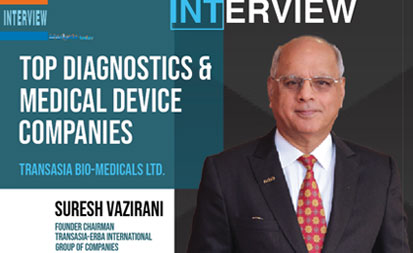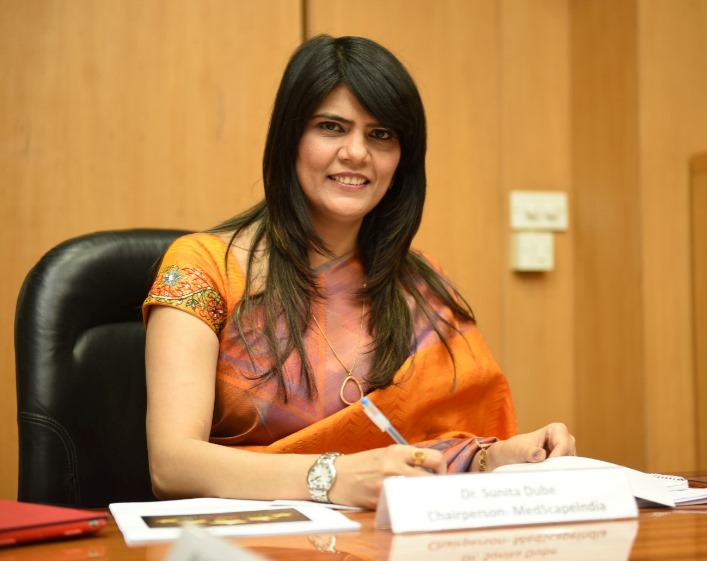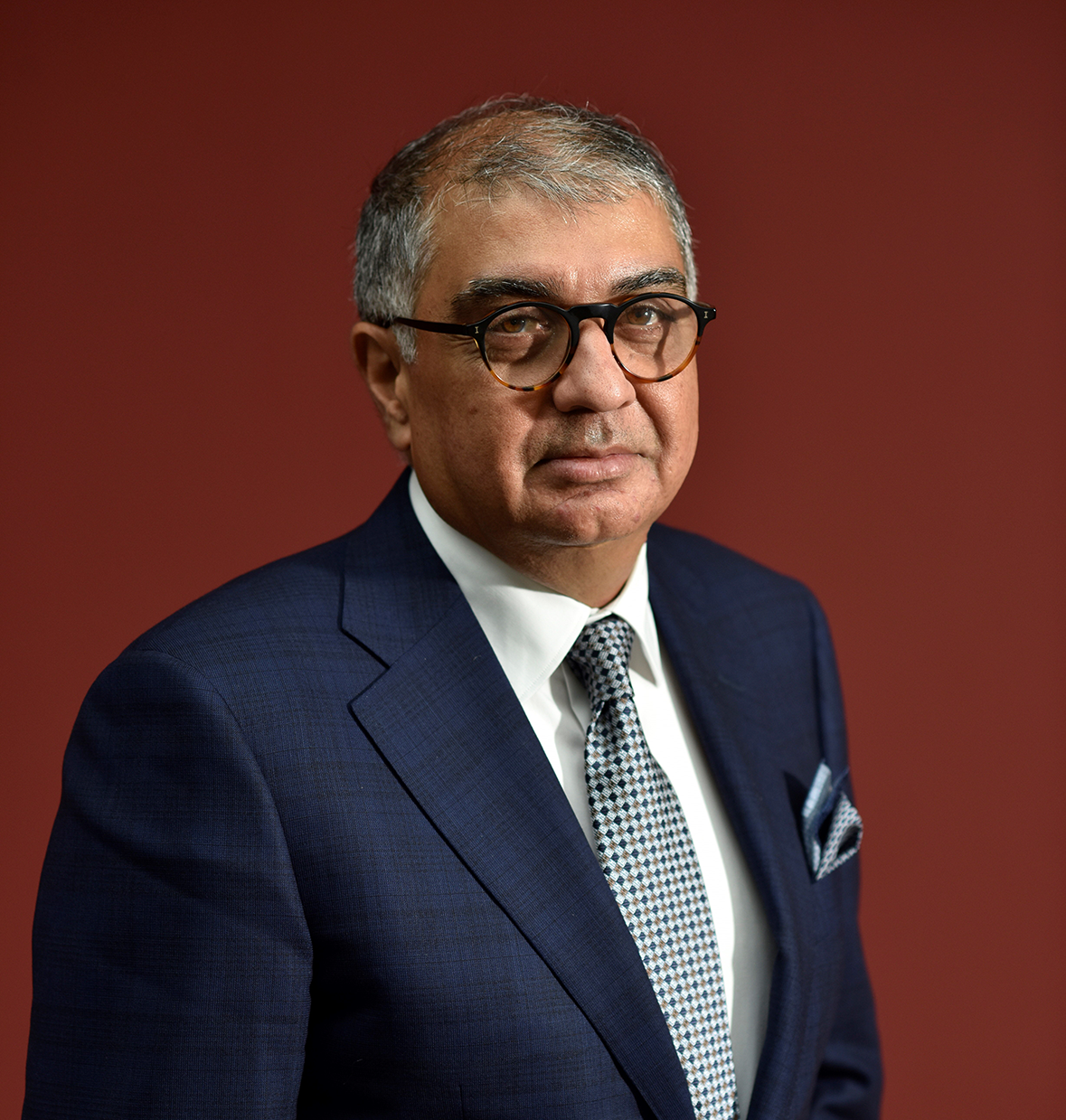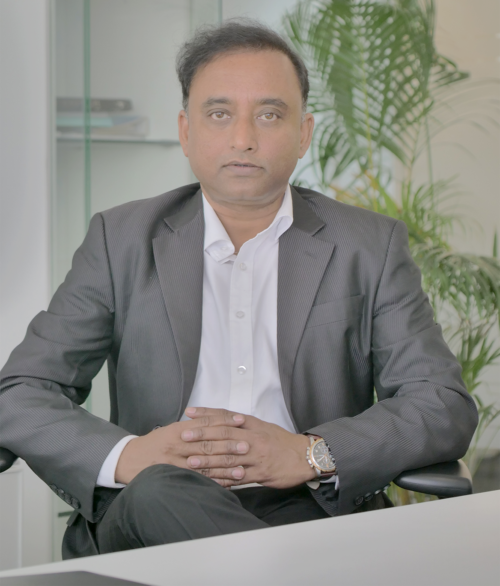Top Diagnostics & Medical Device Companies Transasia Bio-Medicals Ltd.
When you look back at your long and successful career in the field of diagnostics, what are some immediate reflections that comes to mind? When I was about 20 years old, I happened to read a quote by Mahatma

When you look back at your long and successful career in the field of diagnostics, what are some immediate reflections that comes
to mind?
When I was about 20 years old, I happened to read a quote by Mahatma Gandhi, “FIND PURPOSE. MEANS WILL FOLLOW.” I believed that this quote could be true. Some years later, when looking at the very poor healthcare facilities for the common man in India, I decided to do something about improving the situation. I knew that this was the big PURPOSE of my life even though I had absolutely no resources or means for achieving such an ambitious purpose. I had just Rs 250 as my total means. But believing in Mahatma Gandhi’s saying, I decided to take a plunge and founded Transasia Bio-Medicals with Rs 250 to achieve the big Purpose of improving healthcare in India and Asia. Fortunately, Gandhiji’s saying came true and I could raise resources from totally unexpected quarters.
In the 1980s, the Indian IVD Industry looked a lot different than it is today. Blood tests are very important for prevention and treatment of diseases. Over 70% of treatment decisions depend on diagnostic tests. But pathology laboratories in India used to perform blood tests with manual means which were very tedious and inaccurate. In developed countries, labs were using a lot of automated equipment but Indian labs could not afford such equipment. As a result, very few Indians could get their blood tested. Transasia Bio-Medicals was the first company to start manufacturing IVD products in India, way back in the 1990s. Today over 50,000 labs in India use Transasia’s sophisticated instruments to test over 20 crore people every year. I am glad, that in our own little way, we have helped improve healthcare in India.
Commitment to customers: All Transasia employees strongly believe that Transasia’s ‘purpose’ is to help Doctors take better care of patients. We always put ‘India First’. Hence all Transasians, go out of their way to support customers whether it be during the day or night. One big example of it is the way our 700 sales and service engineers all over India continued to visit hospitals and labs even during the COVID lock-downs to service machines. Moreover, none of our five factories stopped manufacturing much required instruments and test kits. Not only that, but in the thick of the lock-downs, Transasia set-up a totally new and Asia’s largest factory in Visakhapatnam to manufacture COVID test kits. Many customers told us that Transasia was the only company in India which did not stop customer support even for a single day during the pandemic. This makes me very proud of my team who worked relentlessly to support lakhs of doctors all over India in dealing with the pandemic.
Adopt new technologies: I would say that the last two decades have witnessed fast-paced technological advancements in the field of diagnostics. Early adoption to new technologies such as integration of AI, has helped us serve our customers better while ensuring our products remain relevant to meet their evolving needs. Considering the fact that in India engineers and scientists are not yet familiar with these new technologies, Transasia has acquired four R&D centers in Europe and USA to provide latest technologies to Indian doctors and patients.
The toughest of problems give birth to the best of solutions. In this context, and rather optimistically, how has the pandemic led to the emergence of innovations in diagnostics?
The pandemic has led to greater focus on preventive diagnosis as a first step towards a healthier nation. And this has led to innovation, in product development, delivery and business model. Advancements in product technology and the need for convenient sampling is leading to a paradigm shift for less invasive tests that rely on saliva and dried blood spots. Transasia remains at the forefront of this transformation.
Point-of-care testing is gaining grounds owing to its ease-of-use, short TAT, low cost and reducing the volume of lab tests, etc. Technological advancements are leading to development of smart phones and other analytical wearable devices linked to POCT.
Having said that, though POCT is a growing market, advanced diagnostic tests will still be conducted in large laboratories because of their high analytical performance. And for high throughput laboratories, there is a growing trend for high grade of automation and integration of various disciplines such as serology, hematology, biochemistry, molecular and microbiology for higher efficiency.
The COVID pandemic has accelerated the pace for adoption of superior diagnostic testing methods such as molecular and nex-gen sequencing. The interplay of genomics and technology aids in assessing the disease pre-disposition and implementing personalized treatment modalities. Prevalence of diseases like HIV, autoimmune disorders, TB and malignancies will foster the growth of this segment. Integration of a smart Laboratory Information System (LIMS), offers a multitude of benefits such as maintaining and upgrading digital patient records, inventory management, etc. at the click of a button and impacting the efficiency of lab services.
Also, less optimistically, what are some of the biggest challenges in the industry now brought to light by the virus?
First and foremost the pandemic exposed the biggest problem that has been challenging us as a nation, the dependency on imports. Even today, 70% of medical devices have to be imported by India. No large country like India can succeed in providing ‘Proper Healthcare for All Indians’ if it has to rely heavily on imports. However, this realization has given a fillip to the concept of Atmanirbhar Bharat. The setting up of medtech parks is a positive move in this direction. Secondly, it has brought to the forefront the need for a stronger healthcare infrastructure. The good news is that the government has made a huge 137% increase in the budget allocation for the healthcare sector in the current financial year. This is indeed a laudable step to meet the inadequacies of our healthcare system, which at present is predominantly designed to treat and not prevent diseases. India must move to the next state of proactively preventing diseases by providing early and regular diagnostic tests to every Indian.
What is the outlook of global IVD market? What is Transasia’s plan to expand across the globe?
Like India, most countries in the world realize the importance of early and regular diagnostic tests for its citizens. The global market for diagnostics products is huge and growing fast. The Indian diagnostic industry is expected to grow at a CAGR of about 20% over next 5 years. Transasia Bio-Medicals is already exporting its products to over 100 countries of the world. And it plans to grow much faster than the industry growth.
Lastly, over the decades since the inception of Transasia, has there been any significant change in the company’s governing principal?
Transasia’s foundation rests on strong principles of quality, reliability and affordability. This is something that has not changed in over forty years of our existence. On the other hand, we continue to improve our technologies while shaping the company for the future. Understanding evolving customer needs and ensuring that any new endeavour is aligned to our existing long-term strategy has helped us grow strong while retaining our leadership position in the industry.






